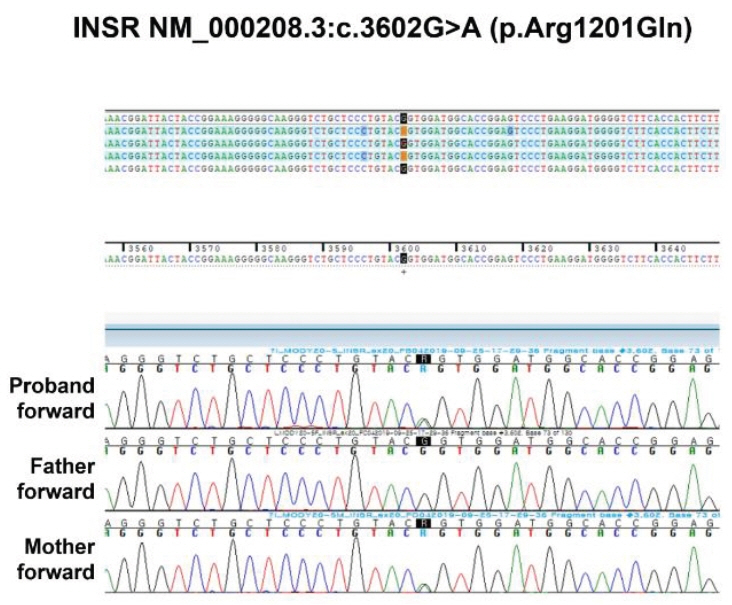Ann Pediatr Endocrinol Metab.
2023 Dec;28(Suppl 1):S17-S19. 10.6065/apem.2244106.053.
A case of type A insulin resistance syndrome in a 14-year-old adolescent girl without common clinical features
- Affiliations
-
- 1Department of Pediatrics, Daegu Catholic University School of Medicine, Daegu, Korea
- 2GC Genome, Yongin, Korea
- KMID: 2549333
- DOI: http://doi.org/10.6065/apem.2244106.053
Figure
Reference
-
References
1. Parker VE, Semple RK. Genetics in endocrinology: genetic forms of severe insulin resistance: what endocrinologists should know. Eur J Endocrinol. 2013; 169:R71–80.
Article2. Semple RK, Savage DB, Cochran EK, Gorden P, O’Rahilly S. Genetic syndromes of severe insulin resistance. Endocr Rev. 2011; 32:498–514.
Article3. Moller DE, Cohen O, Yamaguchi Y, Assiz R, Grigorescu F, Eberle A, et al. Prevalence of mutations in the insulin receptor gene in subjects with features of the type A syndrome of insulin resistance. Diabetes. 1994; 43:247–55.
Article4. Moritz W, Froesch ER, Boni-Schnetzler M. Functional properties of a heterozygous mutation (Arg1174Gln) in the tyrosine kinase domain of the insulin receptor from a type A insulin resistant patient. FEBS Lett. 1994; 351:276–80.5. Preumont V, Feincoeur C, Lascols O, Courtillot C, Touraine P, Maiter D, et al. Hypoglycemia revealing heterozygous insulin receptor mutations. Diabetes Metab. 2017; 43:95–6.6. Takahashi I, Yamada Y, Kadowaki H, Horikoshi M, Kadowaki T, Narita T, et al. Phenotypical variety of insulin resistance in a family with a novel mutation of the insulin receptor gene. Endocr J. 2010; 57:509–16.
Article7. Domínguez-García A, Martínez R, Urrutia I, Garin I, Castaño L. Identification of a novel insulin receptor gene heterozygous mutation in a patient with type A insulin resistance syndrome. J Pediatr Endocrinol Metab. 2014; 27:561–4.
Article8. Wei C, Burren CP. Diagnostic and management challenges from childhood, puberty through to transition in severe insulin resistance due to insulin receptor mutations. Pediatr Diabetes. 2017; 18:835–38.
Article9. Ariza Jiménez AB, López Siguero JP, Martínez Aedo Ollero MJ, Del Pino de la Fuente A, Leiva Gea I. INSR gene mutation. Insulin resistance with low prevalence in pediatrics. A case review. Endocrinol Diabetes Nutr (Engl Ed). 2019; 66:588–91.
Article10. Musso C, Cochran E, Moran SA, Skarulis MC, Oral EA, Taylor S, et al. Clinical course of genetic diseases of the insulin receptor (type A and Rabson-Mendenhall syndromes): a 30-year prospective. Medicine (Baltimore). 2004; 83:209–22.
- Full Text Links
- Actions
-
Cited
- CITED
-
- Close
- Share
- Similar articles
-
- Clinical Manifestation and Elevated Serum Insulin-like Growth Factor-1 (IGF-1) Levels with Post-adolescent Acne
- Insulin Resistance and Insulin Resistance Syndrome
- Polycystic Ovary Syndrome in Adolescence. Role of Insulin Resistance
- Insulin Resistance in Non-Alcoholic Fatty Liver Disease
- Insulin Resistance in Polycystic Ovary Syndrome


